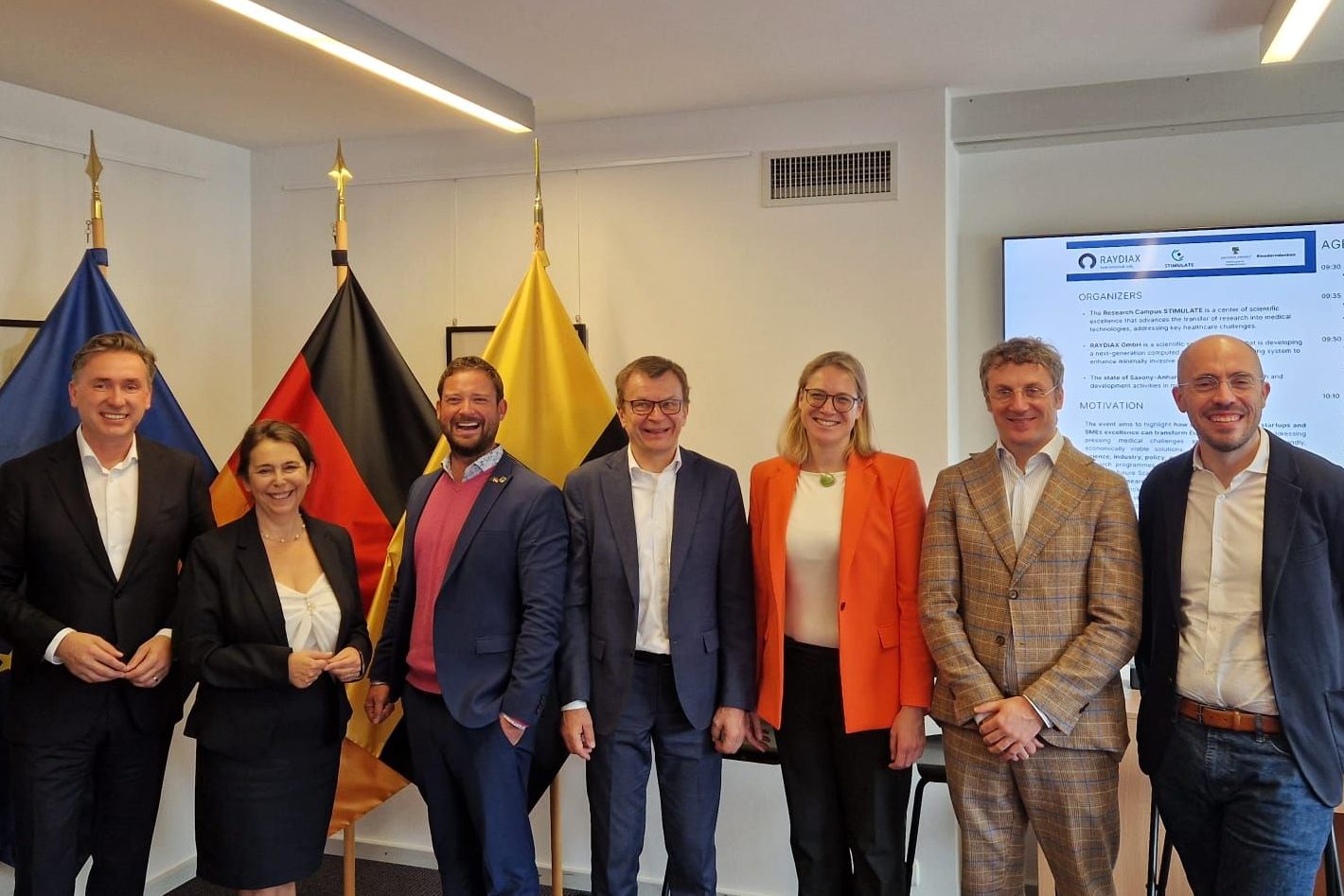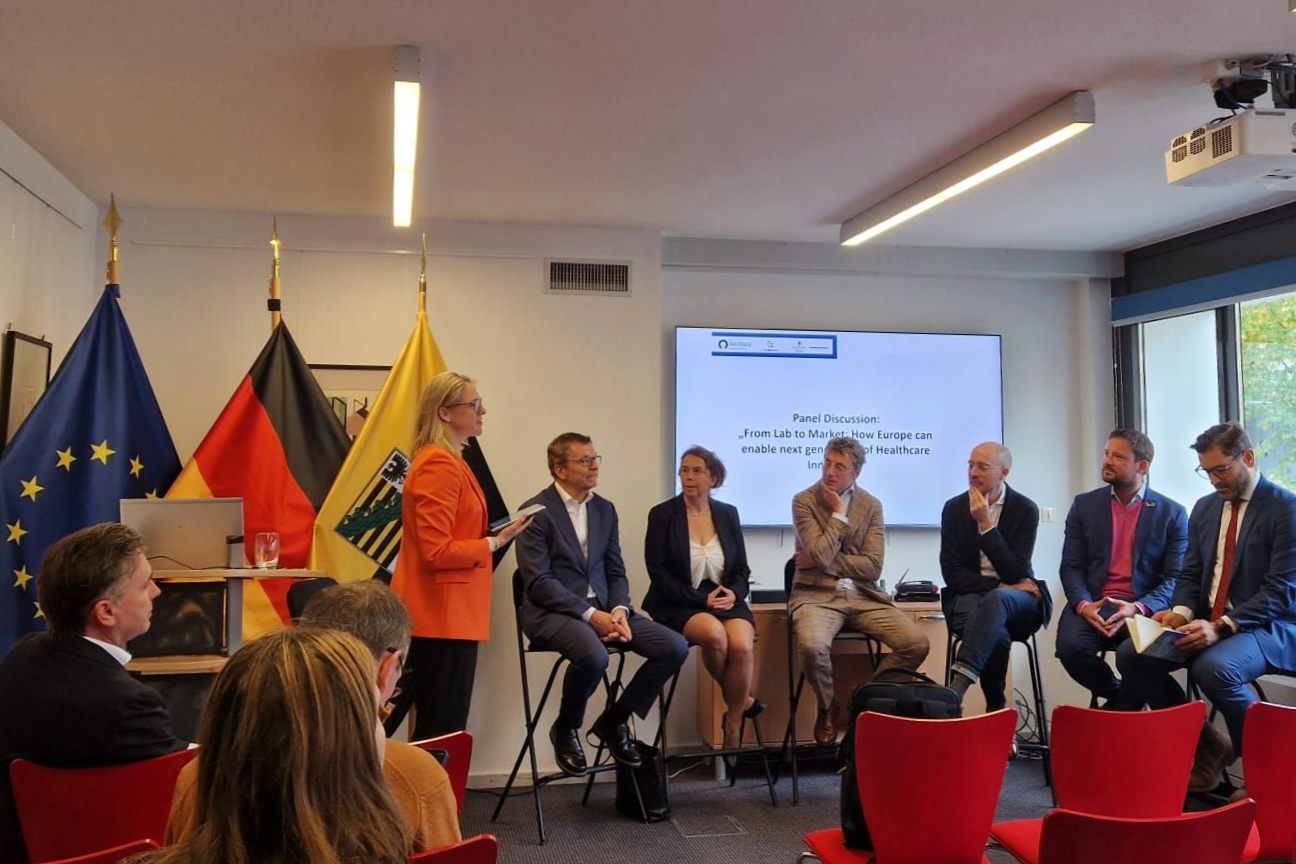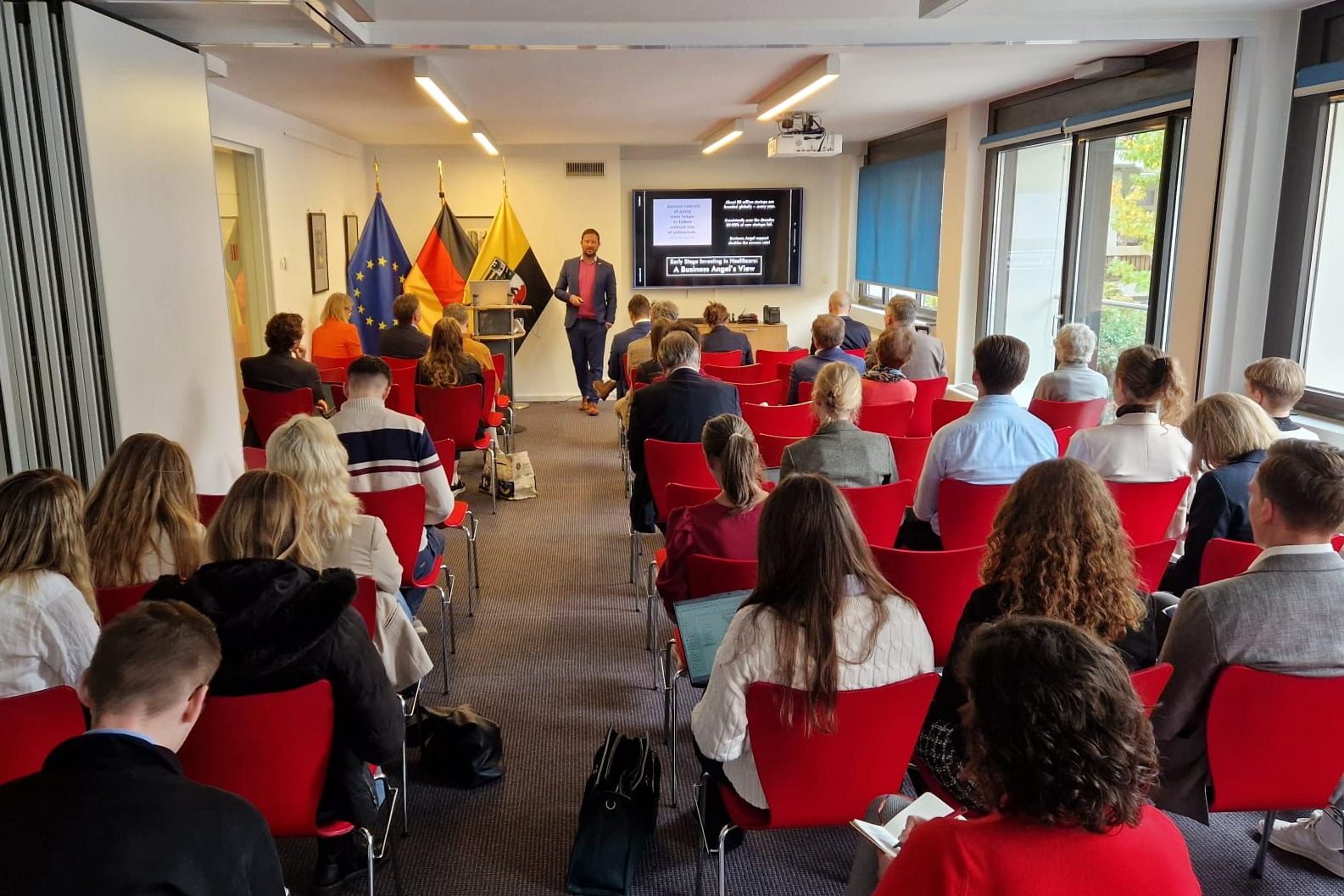NEWS
Exchange in Brussels on the Future of European MedTech
On 29 October 2025, a specialist event on the topic of ‘Transformation of the European healthcare system: from start-up financing to groundbreaking medical devices’ took place at the Representation of the State of Saxony-Anhalt at the European Union in Brussels.
It was organised by the Research Campus STIMULATE, Otto von Guericke University Magdeburg and RAYDIAX GmbH, a medical technology start-up that emerged from STIMULATE. Around 70 participants from politics, business, science and EU institutions took part in the English-language event. It was opened by Daniel Wentzlaff, Deputy Head of the State Representation.
The discussions focused on the new EU Start-up and Scale-up Strategy, which was adopted on 25 May 2025 and aims to strengthen Europe's innovative capacity. It aims to increase the EU's competitiveness in global markets, facilitate the financing of innovative companies and translate research results into marketable products more quickly. Representatives of the European Commission, including Anna Krzyzanowska and Francesco Florindi from the Directorate-General for Research and Innovation (DG RTD), explained the strategic priorities of the new EU policy, such as improved financing for deep tech companies, simplified regulatory frameworks, and initiatives to strengthen talent, infrastructure, and networks in Europe.
Professor Georg Rose, Director of the Research Campus STIMULATE, emphasised in his contribution the importance of long-term funding, topic-specific project financing and the development of an innovation-oriented ecosystem. Using state-of-the-art image-guided medical technology, he demonstrated the relevance of research transfer and the role of start-ups in growth and competitiveness. State Secretary Thomas Wünsch highlighted STIMULATE's development into a European centre of excellence for medical technology and underlined the importance of close cooperation between science, industry and clinical partners in creating a European high-tech medical ecosystem.
One highlight of the event was the presentation of RAYDIAX Therapy Assistance CT (TACT) by Sebastian Gugel, Head of Medical Affairs of RAYDIAX. The newly developed computed tomography system is specially tailored to the requirements of minimally invasive cancer treatments and is intended to enable surgeons to provide more precise, dose-optimised and safer therapy in the future. Alessandro Zanasi, Marketing Manager, introduced STIMULATE partner IGEA CLINICAL BIOPHYSICS. Their vision is to revolutionize medicine by replacing conventional surgery with innovative, minimally invasive therapies.
In the ensuing discussions, it became clear that start-ups play a key role in the transformation of the European healthcare system, but continue to face significant challenges in terms of financing and market implementation. Representatives from politics and business agreed that programmes to promote clinical pilot applications and EU-wide investment initiatives are crucial to overcoming the so-called ‘valley of death’ in the medtech sector.
Austausch zur Zukunft der europäischen Medizintechnik in Brüssel
Am 29. Oktober 2025 fand in der Vertretung des Landes Sachsen-Anhalt bei der Europäischen Union in Brüssel eine Fachveranstaltung zum Thema „Transformation des europäischen Gesundheitswesens: von der Startup-Finanzierung bis zu bahnbrechenden Medizinprodukten“ statt.
Organisiert wurde sie vom Forschungscampus STIMULATE, der Otto-von-Guericke-Universität Magdeburg und dem aus STIMULATE hervorgegangenen Medizintechnik-Startup RAYDIAX GmbH. Rund 70 Teilnehmende aus Politik, Wirtschaft, Wissenschaft und EU-Institutionen nahmen an der englischsprachigen Veranstaltung teil. Eröffnet wurde sie durch Daniel Wentzlaff, stellvertretendem Leiter der Landesvertretung.
Im Mittelpunkt der Diskussionen stand die neue EU-Startup- und Scale-up-Strategie, die am 25. Mai 2025 verabschiedet wurde und die Innovationskraft Europas stärken soll. Sie zielt darauf ab, die Wettbewerbsfähigkeit der EU gegenüber den globalen Märkten zu erhöhen, die Finanzierung innovativer Unternehmen zu erleichtern und Forschungsergebnisse schneller in marktfähige Produkte zu überführen. Vertretende der Europäischen Kommission, darunter Anna Krzyzanowska und Francesco Florindi von der Generaldirektion Forschung und Innovation (DG RTD), erläuterten die strategischen Schwerpunkte der neuen EU-Politik, wie u.a. eine verbesserte Finanzierung für Deeptech-Unternehmen, vereinfachte regulatorische Rahmenbedingungen sowie Initiativen zur Stärkung von Talenten, Infrastrukturen und Netzwerken in Europa.
Professor Georg Rose, Vorstand des Forschungscampus STIMULATE, betonte in seinem Beitrag die Bedeutung langfristiger Förderung, themenspezifischer Projektfinanzierungen und des Aufbaus eines innovationsorientierten Ökosystems. Anhand modernster bildgeführter Medizintechnik zeigte er die Relevanz von Forschungstransfer und die Rolle von Startups für Wachstum und Wettbewerbsfähigkeit auf. Staatssekretär Thomas Wünsch hob die Entwicklung von STIMULATE zu einem europäischen Exzellenzzentrum der Medizintechnik hervor und unterstrich die Bedeutung der engen Kooperation von Wissenschaft, Industrie und klinischen Partnern für die Schaffung eines europäischen High-MedTech-Ökosystems.
Ein Höhepunkt der Veranstaltung war die Vorstellung des RAYDIAX Therapy Assistance CT (TACT) durch Sebastian Gugel, Leiter "Medical Affairs" von RAYDIAX. Das neu entwickelte Computertomographiesystem ist speziell auf die Anforderungen minimal-invasiver Krebsbehandlungen zugeschnitten und soll künftig Chirurg:innen eine präzisere, dosisoptimierte und sichere Therapie ermöglichen. Alessandro Zanasi, Marketing Manager, stellte den STIMULATE Partner IGEA CLINICAL BIOPHYSICS vor. Deren Vision ist es, die Medizin zu revolutionieren, indem konventionelle Operationen durch innovative, minimalinvasive Therapien ersetzt werden.
In den anschließenden Diskussionen wurde deutlich, dass Startups eine Schlüsselrolle bei der Transformation des europäischen Gesundheitswesens einnehmen, aber weiterhin vor erheblichen Herausforderungen in der Finanzierung und Marktimplementierung stehen. Vertretende aus Politik und Wirtschaft waren sich einig, dass Programme zur Förderung klinischer Pilotanwendungen und EU-weite Investitionsinitiativen entscheidend sind, um das sogenannte „Valley of Death“ im MedTech-Sektor zu überwinden.


